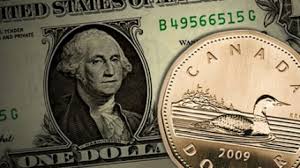The weakening Canadian Dollar got me to thinking about the effect it is having, if any, on the back issue comic book market.
Comic books are like oil in that they are traded in U.S. dollars. The price guide is quoted in U.S. dollars, almost all the big internet dealers are U.S. based and all the major comic auction sites are U.S. and prices are quoted in U.S. Dollars.
Basically holding a comic collection is like holding U.S. dollars.
Canadian collectors and investors and for that matter European, Asian and Australian collectors all suffer decreasing buying power if their currencies are losing ground versus the U.S. Green Back. I live and work in Canada and am paid in Canadian Dollars, as of this post I have less buying power than I did a year ago based on my monthly allocation of Canadian dollars to buy comics.
In this situation it is best to realize that the comic I purchase will one day be sold in U.S. Dollars and I may see a gain due to an ever-increasing U.S. Dollar or a loss due to a correcting Canadian Dollar. These fluctuations are apart from the value fluctuations each comic may experience, value fluctuations caused by demand fluctuations for that particular issue.
But wait, how far removed is a weakened foreign currency to a weaker demand for a comic?
The back issue comic market is now global; buyers from all over the world are grabbing up these American pop culture time capsules also known as comic books.
You can tell me all you want about how it all evens out in the end but right now, today, getting me to plop down $400 for that Scooby Doo, when I know I could have bought it for $355 only 6 months ago, will not be an easy task. That $45 is $45 and I could grab a nice case of Stella on sale for the difference. I simply may not have the extra money at the moment, my budget may be set so I may only grab 6 book off that auction and not 7.
So yes, obviously currency fluctuations affect demand. I’d bet Canadians are not as active on the auction houses now as they were a year ago.
As I was contemplating the exchange rate’s effect on the market I notice a couple of other more recent trends that are also playing a role in shaping today’s market. These are taxation and regulation.
Auction houses like ComicConnect and Heritage now have firm taxation policies in effect. Taxation has always been there though it was not policed on the net as diligently as it is today. No escaping the tax man it seems.
Taxation has been creeping into local comic book shops too and to a degree at cons as well.
Most comic shops worth their salt are just that, worth their salt. These new progressive comic shops are not the old “ma and pa” or the “buddy boy and pal” enterprises that flip second hand stuff for cash. Good comic shops these days are viable businesses and good corporate citizens. They charge tax on everything including back issues. Even if they didn’t charge tax to you they for sure ate the tax when putting the sale through and for sure had adjusted the price up slightly to compensate.
Safe to say that the maturing of the back issue market has seen more and more dollar value go through “over the counter” channels. These transparent channels have taxes and this too surely is affecting the market.
More and more regulation is creeping into the market. Regulation and standardization can be a good thing as it can eliminate cheaters and scammers but the result is usually increased costs to the consumers. Case in point the new eBay Global Shipping Program. Basically a seller ships to a warehouse in say Kentucky and eBay charges the seller say $15 then eBay ships to the customer in Calgary for say $40. No more shipper arranging shipping. This could be seen as good in that it eliminates fly by night shippers and shipping scammers, bad in that it eliminates honest shippers willing to ship you that $35 Nova #1 you just bought for $10 shipping. Now eBay may charge you $30 shipping. I may be willing to pay $45 for my Nova but I’m not willing to pay $65 (add my weak Canadian dollar and whoa!).
All this stuff, the rising U.S. Dollar, the increased taxation, the increase in costs due to regulation, must be affecting demand adversely ?
Still on the high end marketplace we are seeing record results. Perhaps the market is eroding on the lower end? Unfortunately I don’t have enough data to reach a conclusion.
What seems evident is that the wild west laissez-faire days are over, the back issue comic book market is saying bye to Freidman and hello to Keynes.
Shouldn’t the more regulated market be chasing more books underground? Craigslist? Kijiji? Forums?
Yes more people are trying to find back issues in places where they can avoid these costs but it is costing them in time and effort.
I’ll stick my neck out and say that a disproportionate amount of these people are the old veterans, ones that can’t fathom paying a penny more than they think they have to and will go to great lengths to save that last penny. For many of these folks it’s almost the principal of the thing.
Still, lots and lots of new buyers and investors are jumping on board and they simply don’t have the knowledge or skills to root out these savings, they most certainly don’t have the time en masse to spend years to learn.
Are we slowly buying into a more structured, more expensive market? Are we trading costs for security and time?




I agree with everything you’re saying Walt. It’s a time to lay low if you’re buying books in American dollars with Canadian cash. I can remember when the Canadian dollar was over 1.05 US and we were able to outbid American bidders because of that 5% plus cushion. I have the luxury of getting around this situation by having a cache of desirable books that I purchased cheaply years ago and can convert them into U.S. dollars on line and use that revenue to purchase the books I want without taking the currency exchange hit.
The other thing I’ll comment on is the relatively new Global shipping program from Ebay. If I see the icon advertising this on the seller’s listing, I don’t go any further and I’m out of there. I once wanted a Canadian postcard with an illustration by a Canadian Whites artist on it from a seller who was using Global shipping. The buy it now was 3,95 but the cost of shipping (mailing and customs) came to almost $15. When I checked out the listing on the US Ebay site and entered my address for shipping as a US address the shipping cost was $2.50.Global shipping is just an Ebay money grab and I don’t know how long it will take for sellers using it to realize they are locking many Canadian buyers out of their potential market.
I agree with both Walt and Ivan.The Global shipping I used once on a framed Gene Colan DD original art piece cost twice as much for shipping and took twice as long to get here.I also avoid it like the plague if I see it on ebay.
Another hit now when buying from some of the big auction houses is duty.It adds up big time on a Silver Age key book!There is an aweful lot of regulations that get in the way anymore and the advantage goes to the taxman everytime.The only advantage you have is if you are selling books that you bought in the Canadian marketplacemoving them at US dollars.
Selling those books for US funds to by more is a great strategy Ivan. I’ve heard from a few buyers re the Global shipping from eBay. I’m sure it doesn’t affect the $1000 books so much but the small items must be taking a beating. Surely there are sellers on eBay selling $5 to $20 dollar items who over the years has build up a large international customer base, this program must be killing them if they signed on.
I think the taxman coming in and getting his share means the market has gone legit! The thing is in order for it to have gotten this far enough people had to buy into this new regime. It seems like enough have.
Another thing that Canadian buyers/importers may not know about is that any item (other than spirits or wines) produced over 50 years ago but less than 100 years from the time you import it is considered duty/customs free (produced more than 100 years ago it’s considered an antique and is still duty/customs free). This means that you should be able to bring in all golden age books and a lot of key silver age books (up to 1964) without customs charges. I wonder if the global shippers who say the cover all customs and import charges know this. See: http://blog.pcb.ca/2013/02/importing-antiques-into-canada-duty-free/3634 .
It’s completely different in England. We have increased buying power but on the flip side lost selling power. The comics I’ve personally bought for example, Amazing Spiderman #24. If I bought it today instead of 4 months ago I would of saved £30.00’ but instead I would lose £30.00 if I sold it today . Its annoying in a way but means I can better deals now if the exchange rate says the same. Only if it does?
I too , will stay away from any US seller using the global shipping program . I have a friend who works for the cbsa here in the Vancouver area and he tells me that’s illegal for a company or other identity to collect import duties coming into Canada . that responsibility is up to the cbsa only ! food for thought
Walt. I for one will buy a book no matter what the loonie is doing. won’t be any book, but certainly a key issue that i want, won’t make a difference for me if it’s 5% or 20% more than a few years ago. sure, we had a great run with the canadian dollar for a while, but i remember the days when i was adding 30-50% on top of guide prices for issues i was buying.
will give you an example. i’m looking at some books now that will be around $700. a few years ago, it was par.. or less… now say.. closer to $800 … so what… i intend to hold on to the books at least for the next 20 years. who knows what the loonie will do between now and then .. what if we go to the good old days when it was 1.50 or 1.60/USD? and if the loonie gets stronger, does it make a difference to me if the book appreciates by a lot more over the next few decades?